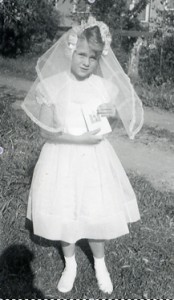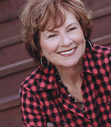Bless This Mess

Cathy Clemens, 1st Holy Communion
Raised Catholic, I’m hard-wired for formal prayer. I find myself reciting the Our Father when an earthquake hits and oftentimes at night as I go to sleep. I think, “how weird,” stop in the middle, but then a Hail Mary (a woman of whom I hold equally wobbly beliefs), arises to take its place. I surrender and move on to blessing my family, my friends, and then the people who irritate me. Some nights I just cut to the chase and bless the ones I seriously want to smack upside the head.

1st Holy Communion
Remembrance Card
In an attempt to reverse my resentment, I practice a loving-kindness prayer. I do it for myself, those closest to me, and for those to whom I feel neutral. By the time I make it to those with whom I have difficulties—which are often the ones closest to me—my “yeah, but” takes over, gathers evidence by rehashing past transgressions, lumps them into one huge hairball, and gets the last word. First I cough, then I laugh. So much for being spiritual. At least I’m aware that I’m being a ding dong.
When someone acts completely stoopid, the best I can do is to be grateful that I’m not living inside their skin; I can’t imagine what it must be like for them to wake up every morning and face their reflection in the mirror, which is enough to get me off whatever momentary rant I happen to be on. Then there are the awkward moments when I realize that I AM them, and that they are simply reflecting ME. And the occasions that really bring me to my knees are when a veil lifts and I can see my part in setting up a whole catastrophe, ferreting out what I get out of replaying the story that has me by the throat. Usually it’s my righteousness, my “how could this be happening to me,” my “how did I get here, this isn’t my fault.” Maybe I just want to be mad. I know what being mad feels like: familiar, oddly comforting. Or maybe replaying my old narrative is another chance to heal it. It’s just that I don’t see my part until after, that the choices I made delivered me right back into my old and astonishingly familiar doorstep. What I find fascinating is that a door is involved in every one of my it’s got me by the throat again stories, every damn one of them! I recognize it as a sign, a symbol, a clue hinting, hinting, hinting that what’s happening (my particular slant of it anyway) may not be r e a l i t y … like the parable of the elephant and the blind men. Thank God (which one, I’m never sure) I’ve gained some perspective and that I’ve a sense of humor. Many days it’s the only way I make it through, then night falls and I’m back to trying to bless this mess. And maybe I try minding my own business and let the chips fall where they may. Now that’s a novel thought.
Both of my grandmothers were Catholic, stubborn, and right. I’m very much like them, though I don’t know why I still refer to myself as Catholic. I’m addicted to being right (a first cousin to being perfect), both which have a tendency to be corrosive in relationships. Like kidney disease and bad eyes, resentment is in our DNA coating, creeping down through the generations, across lines, round the corners and back again. Like my Grandma Nellie Chatfield: the higher she stood on her moral ground, the lower her family descended. When Grandpa Charlie (who had the propensity to err) died, the only thing she had to say was, “serves the damn fool right,” then she buried him in an unmarked grave in the non-Catholic section of the cemetery. Now that’s pissed off.
It’s hard to restore family grace if there wasn’t much there to begin with, though it does make for good storytelling. C’mon, who’s captivated by the tales of Catholic farmers who had a million kids, stayed on the same land for generations, worked hard, and never broke the rules? They lend stability via my Clemens’ side (for which I’m exceedingly grateful), but offer little of interest to write about. Fiction is too complicated for me to create, and really, why bother when my Chatfield, Hoy, and Chamberlin lines teem with an overabundance of characters who supply me with endless material. I’m fascinated by these folks (while at the same time rather appalled at their bad behavior) and couldn’t make some of this stuff up if I tried. I have missing mothers, though they do generally reappear (of note: there are four generations of mothers in my direct line who, with infants in tow, left their husbands; I am the last of that tradition. Actually, my mother didn’t leave with her children, she just took her coat and two suitcases). I’ve been gifted the stories that could make for interesting page turners: drugs, pills, prison, gambling, murder, kidnapping, rape, child abuse, molestation, neglect, abortions, racism (you’d be horrified; I am), asylums, shock treatments, and suicides. I also have poisonings, cattle thieves, embezzlers, liars, bookies, bettors, bootleggers, and drunks. I have a grandfather who gambled away the ranch. I have gay elopements, multiple marriages, numerous divorces and a boatload of annulments. I have flying saucer abductions, a tea leaf reader, spirits, voodoo, and ghosts. And that’s just on my mother’s side, though I notice that several of us married into similar lines, cementing our proclivity to chaos. I don’t have to ponder what to write about. I have to ponder what NOT write about. I bear generations of resentments handed down: siblings suing each other, daughters dancing on graves, parents cutting children out of the will. We like to hang on to things. I know that most of the hurts siblings nurse against one another stem from when we were little kids. LITTLE KIDS! Little kids who were just being little brats. Those are the wars I wonder about, how things that happened when we were younger than five or six years old can ruin a relationship for life. Really? Like when my sister Liz was dying, she forbade her husband and children to allow Claudia, another sister, to attend the family get-together after her passing. When Claudia found out you know what her response was? “It’s okay. She never did like me, ever since we were kids.” REALLY??? And Claudia was just one on the list to not be included. For whatever reason, and with all that goes on, there are more than a few of us who don’t speak to one another, or if we do, we tread lightly, but that’s been going on for years. It’s how we keep the home fires burning.
What can I do in the family to counteract our genetic umbrage? Exposing light on it—though writing about certain things tends to irk some when it’s too close to home. I can do my part to not perpetuate conflict. I know how hard it is though: I so often want to slap the other cheek, and I‘m not about to easily turn mine. I can counteract it by not living as if we’re not connected, and by holding the possibility that things can change. I can choose not to take sides. I can keep an eye on what I’m up to. I can make amends to whom my shiv has wounded; “I’m sorry” goes a long way.
The Metta Prayer
May all beings be happy, healthy and whole.
May they have love, warmth and affection.
May they be protected from harm, and free from fear.
May they be alive, engaged and joyful.
May all beings enjoy inner peace and ease.
May that peace expand into their world and throughout the entire universe.
“If you pray for rain long enough, it eventually does fall. If you pray for floodwaters to abate, they eventually do. The same happens in the absence of prayers.” —Steve Allen (1921 – 2000).

Calvin and Hobbes, by Bill Watterson 8-31-1992
I believe in the ineffable power of prayer, though it’s presumptuous of me to suppose that I can decipher—in the grand scheme of things—to pray for what I think is best. Some say prayers can move mountains; that’s where my critical thinking raises its hairy head, seeking evidence. The best I can do is to still my rattling mind and sit in wonder, silence, and gratitude. To continue to silently recite as a reminder and a comfort: forgive us our trespasses, as we forgive those who trespass against us, the sacred version of let it go, let it go, let it go, sometimes out of habit, other times with intention. Forgiving someone doesn’t mean forgetting what was done, it just means being able to stop pointing fingers and move on. We don’t have to have lunch together.
“If the only prayer you said was thank you, that would be enough.” ―Meister Eckhart (1260 – 1328)
Amen.
Writings~Rambles~Rhymes
- Catherine Sevenau's profile
- 6 followers



